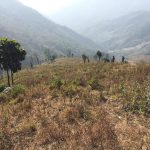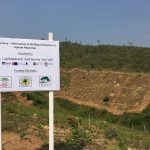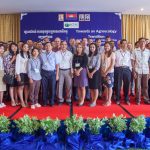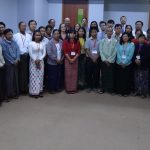11 downloads
Title of document: Finding alternatives to swidden agriculture: does agroforestry improve livelihood options and reduce pressure on existing forest? Authors: Syed Ajijur Rahman, Jette Bredahl Jacobsen, John Robert Healey, James M. Roshetko, Terry Sunderland Ministry/Government Agency/Organisation:University of Copenhagen, Bangor University & CIFOR Year of publication: 2016 Geographic focus: Indonesia Url original document: http://link.springer.com/article/10.1007/s10457-016-9912-4 Summary: Swidden cultivation can contribute to deforestation and land degradation, which can subsequently result in a number of serious environmental problems. This paper examines the economic and social potential of agroforestry systems and the barriers to their widespread adoption, as a land use alternative to swidden cultivation, which may potentially help protect local forest. Based on farmers’ and experts’ assessment, costs and benefits have been estimated, which show that the two investigated agroforestry systems have higher net present value and benefit-cost ratio (B/C) than the two swidden cultivation systems. Tree ownership also creates more permanent rights to farmland and is prestigious in the community. Agroforestry products (fruit, vegetables etc.) have high monetary value and help strengthen social cohesion when shared with neighbors. Read More
4 downloads
Title of document: Agroforestry for Livelihood Security in Agrarian Landscapes of the Padma Floodplain in Bangladesh Authors: Syed Ajijur Rahman, Muhammad Hasan Imam, Denyse J. Snelder, Terry Sunderland Ministry/Government Agency/Organisation: Small-scale Forestry Year of publication: 2012 Geographic focus: Bangladesh Url original document: http://link.springer.com/article/10.1007/s11842-012-9198-y Summary: In the Padma floodplain of Bangladesh, the traditional system of agriculture has become unsustainable due to high population growth. Mango-based agroforestry which has been practiced by the farmers since the 1990s, is a promising alternative and is considered as one of the few options to lift farmers out of poverty and improve livelihood security. This paper examines the potential of mango-based agroforestry to improve livelihoods, using data collected by rapid rural appraisal, farmer participatory research, stakeholder analysis and a farm household survey in six representative villages in the floodplain. Farmers with the least land were found to allocate a higher percentage of their land to agroforestry, and the increased income from agroforestry compared to other agricultural systems helps reduce relative poverty. This income maintains basic household needs, providing food security and fuelwood, and contributes to healthcare, housing and sanitation conditions, and meeting educational expenses. Read More
2 downloads
Title of document: Alder trees enhance crop productivity and soil microbial biomass in tea plantations Authors: P.E. Mortimer, H. Gui, J. Xu, C. Zhang, E. Barrios, K.D. Hyde Ministry/Government Agency/Organisation: Applied Soil Ecology Year of publication: 2015 Geographic focus: China Url original document: www.elsevier.com/located/apsoil Summary: Monoculture farming systems lead to soils depleted of nutrients and diminished microbial functional diversity, disrupting process crucial to maintaining soil health. The planting of trees in these monoculture systems is one way to improve soil nutrition and biodiversity. Therefore, the objective was how planting the N fixing tree Alnus nepalensis (7 years old), into monoculture tea (Camellia sinensis var., assamica) plantations (32 years old), influences the soil fungal and bacterial communities, and how this impacts on tea productivity. Read More

86 downloads
Case study's fact sheet: Agroforestry Alternatives to Shifting Cultivation in Upland Myanmar, Chin State Supported by: World Agroforestry Center East and Central Asia (ICRAF-ECA) In practice since: 2015 Geographic focus: Myanmar School of agroecology: Agroforestry >>> see on map Read More

50 downloads
Case study's fact sheet: Agroforestry Alternatives to Shifting Cultivation in Upland Myanmar Supported by: World Agroforestry Center East and Central Asia (ICRAF-ECA) In practice since: 2016 Geographic focus: Myanmar School of agroecology: Agroforestry >>> See on map Read More

29 downloads
Title of document: Consolidated account of the 4 national multi stakeholder workshops on agroecological transition in the Mekong Region Authors: Pierre Ferrand Ministry/Government Agency/Organisation: ALiSEA Year of publication: 2016 Geographic focus: Cambodia, Laos, Myanmar & Vietnam Summary: This report presents a short consolidated account of 4 national multi-stakeholder workshops addressing Agroecological Transition in the Mekong Region and bringing together 225 participants that have been organized between March and June 2016 (Myanmar, Cambodia, Vietnam Lao PDR). Such workshops aimed at sharing knowledge, information and actions between agricultural development stakeholders. Read More
5 downloads
Title of document: Sustainable Intensification of Tropical Agro-Ecosystems: Need and Potentials Authors: Christain Andres and Gurbir S. Bhullar Ministry/Government Agency/Organisation: Frontiers in Environment Science Year of publication: 2016 Geographic focus: Tropical zone Url original document: www.frontiersin.org Summary: Rapid population growth, increasingly complex economies and novel industrial uses of agricultural products call for further intensification of agriculture, particularly in the tropics. How to achieve sustainable intensification of food production systems in tropical regions that are challenged by ongoing climate change, loss of natural resources and biodiversity is a matter of debate. Here we highlight the major knowledge gaps in agricultural research and policy that must be addressed to develop adequate governance and regulatory frameworks for sustainable agricultural intensification. Read More
9 downloads
Title of document: Case study on Bamboo marketing in Lao PDR Authors: Latsamy Boupha, Phongxiong Wanneng, Bouakhet Sayasouk, and Bouavieng Souphanthong Ministry/Government Agency/Organisation: ICRAF/NUOL Year of publication: 2006 Geographic focus: Laos Url original document: https://www.google.la/?gws_rd=cr&ei=oAE0WN6UDMfsvATvrKewDw#q=Case+study+on+Bamboo+marketing+in+Lao+PDR Summary: Bamboo is non timber forest product, which can found in the tropical and sub-tropical zones. It is fast growing and easy regeneration species. Bamboo is a desirable plant for sustainable management; it has important direct and indirect economic and environmental benefits such as providing shoot for food, culms for housing, furniture, handicraft products and soil and water conservation. Bamboo can play an important role in the reduction of wood consumption, environmental and forest protection, poverty alleviation and sustainable development of rural economy. Read More

28 downloads
Title of document: Proceedings of the national multi stakeholder workshop on Agroecology Transition, Cambodia Authors: Lucie Reynaud, Pierre Ferrand and Dr Saythong Vilayvong Ministry/Government Agency/Organization: ALiSEA Year of publication: 2016 Geographic focus: Cambodia This report presents the main findings of the discussions held during the 2 days workshop addressing the agroecology transition in Cambodia in Phnom Penh on the 30th and 31st of March 2016. Read More

29 downloads
Title of document: Proceedings of the national multi stakeholder workshop on Agroecology Transition, Myanmar Authors: Pierre Ferrand, Dr Htet Kyu and Lucie Reynaud Ministry/Government Agency/Organization: ALiSEA Year of publication: 2016 Geographic focus: Myanmar This report presents the main findings of the discussions held during the 2 days workshop addressing the agroecology transition in Myanmar in Yangon on the 7th and 8th of March 2016. Read More

 Asia & Mekong Region
Asia & Mekong Region  Cambodia
Cambodia  Laos
Laos  Myanmar
Myanmar  Other
Other  Vietnam
Vietnam